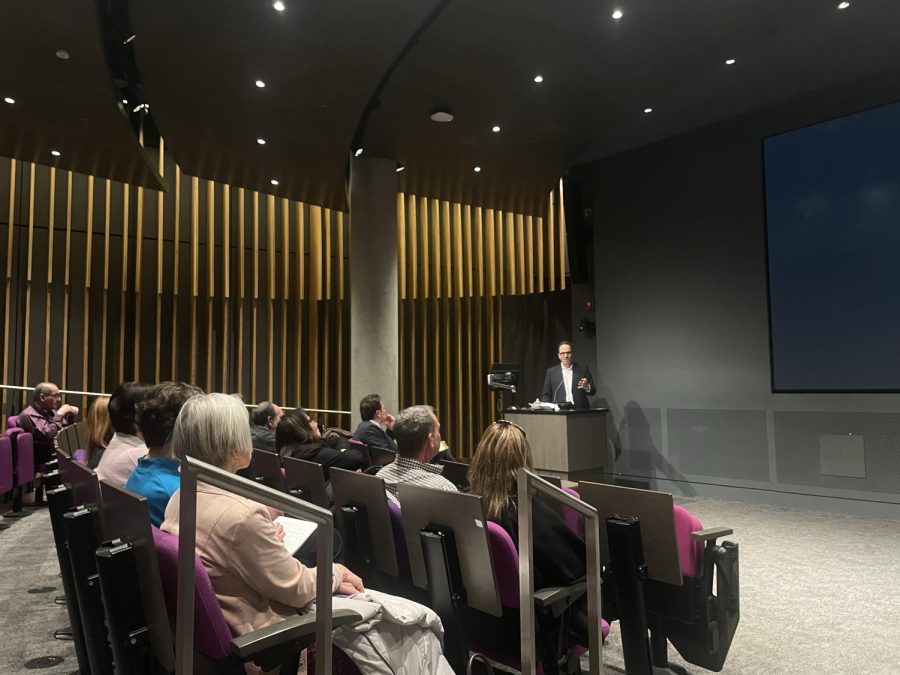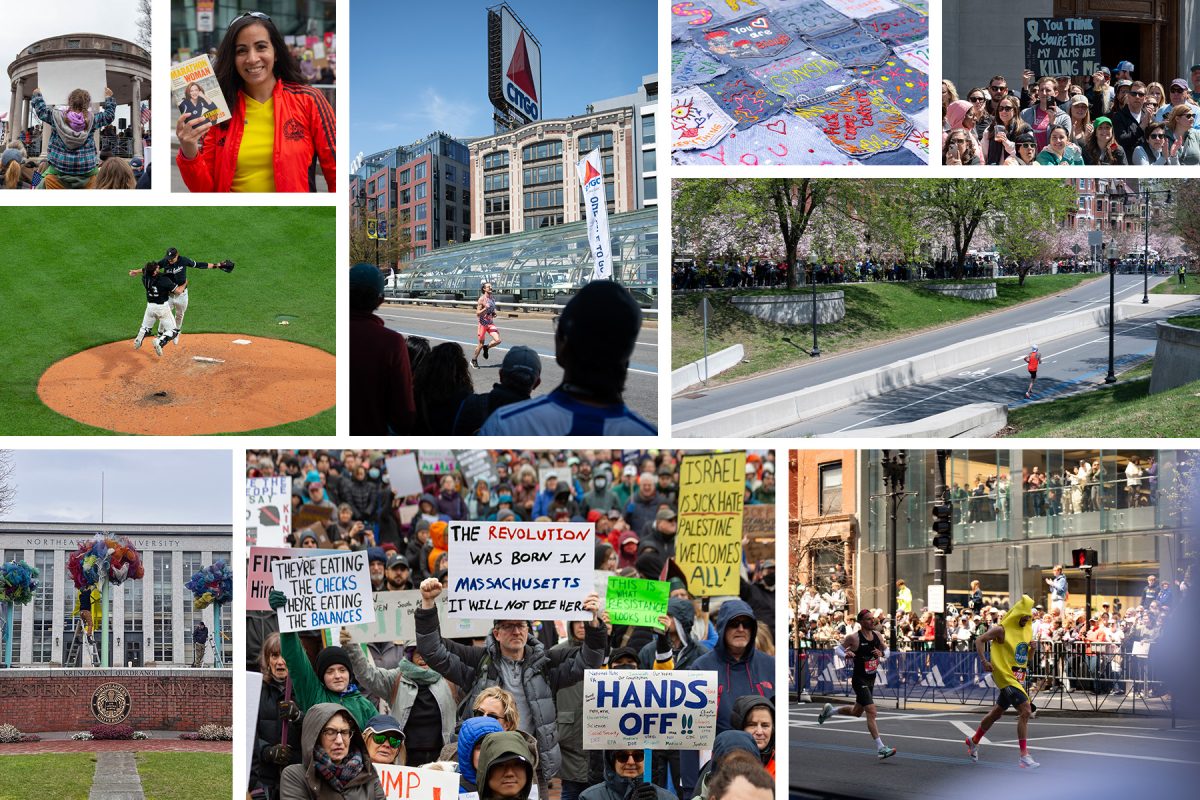Philip Gourevitch comments on the power of genocide memory at annual Northeastern lecture
Gourevitch speaks at the 30th Annual Robert Salomon Morton Lecture. Gourevitch conveyed to attendees the importance of recalling genocide and using that memory to take action to prevent it from happening again.
April 4, 2023
“If it happened once, it can happen again.”
Italian Jewish Holocaust survivor Primo Levi left this warning in his literary work before he died by suicide in 1987.
This reminder still echoes today as genocides have occurred both before and after the Holocaust; including genocides of the Armenian, Bosnian, Rwandan, Cambodian and Sudanese people.
Philip Gourevitch, an author and longtime staff writer at The New Yorker, gave the 30th Annual Robert Salomon Morton Lecture at Northeastern March 30, presented by the Holocaust and Genocide Awareness Committee, the Jewish Studies Program, the Humanities Center, the Department of History and the School of Journalism.
Simon Rabinovitch, an associate professor in Jewish historical and cultural studies, delivered opening remarks.
“There is no topic more apt for current times,” he said in light of the ongoing war in Ukraine.
Gourevitch posed a question in his latest New Yorker article: “Is it time to call Putin’s war in Ukraine genocide?”
The 1948 United Nations Convention defined genocide by the enormity of criminal intent present, not necessarily by scale of slaughter. By “extinguishing Ukraine as an independent nation,” Gourevitch argued Russian President Vladimir Putin is exhibiting genocidal intent.
Gourevitch spoke of his experiences writing in Rwanda during the aftermath of the genocide against the Tutsi people, in which he covered the absence of 70% of the Tutsi population, according to his nonfiction novel “We Wish to Inform You That Tomorrow We Will Be Killed With Our Families.”
Gourevitch said his first visit to the United States Holocaust Memorial Museum in Washington, D.C. in 1994 was when he registered the unsettling concept of people visiting a remembrance museum day in and day out, while atrocious acts of warfare continued in Rwanda in present time.
“When we say ‘never again’ that’s not true,” Gourevitch said. “Instead of saying ‘never again,’ we must sharpen our tools and take action.”
Eliciting support from communities and punishment against perpetrators of genocide should not be a strenuous task, according to Gourevitch.
“The phrase ‘never again’ shouldn’t be so morally challenging,” he said.
During his visit to the museum, Gourevitch recalled speaking with a group of schoolchildren on a trip from the Baltimore Christian Academy. Amidst students reacting to exhibits with remarks such as “cool,” or “eww,” a teacher suggested if the Jews had recognized Jesus as the Messiah, the Lord may have been more forgiving.
Gourevitch described these comments not with anger, but with the knowledge that those children didn’t have the capacity of understanding, at an age where the violence and gore of genocide were simply uncomfortable. As for the teacher, the commentary was a direct product of the version of “memory” personal religious background taught her.
“I can’t believe that someone would say that,” said Charlotte Olmedo, a first-year political science and economics combined major. “That really stuck with me because although I’m a Christian, that’s a very un-Christian thing to do.”
Just as the radical idea of a genocide begins with grouping an entire entity as one, this one group of Christians does not define the community as a whole, Olmedo said.
“Personal, cultural and group memories are often at odds,” Gourevitch said. The meaning of memory changes over time through personal experience and relativity, he said. If not taught properly, meanings of memory when it comes to genocide can be widely misinterpreted or abused.
“There is often reductive language used in describing the Holocaust,” Gourevitch said. He used the example of the film “Schindler’s List” using a “Holocaust horrors” warning on Netflix.
“How can you express extremity in something outside the capacity of understanding?” Gourevitch said. The meanings of sensations such as “cold” or “hungry” can be drastically altered depending on the context.
What “cold” or “hungry” meant to a Holocaust survivor is certainly not what it means in mainstream conversation today.
“We are at an inflection point where the meaning of those memories are changing,” Rabinovitch said. According to him, modern books, films, TV shows and myths continue to change the perception of what a mass atrocity truly means.
“As the gap inevitably widens between the way we understand facts and how we debate them, genuine understanding has the capability to be lost completely,” Gourevitch said.
Attendees had the opportunity to ask questions after Gourevitch’s lecture. Northeastern students, faculty and interested Boston locals took turns sharing their thoughts.
“That was incredible — and terrifying,” said Lori Lefkovitz, the director of the Jewish Studies program at Northeastern.
“People take their identities everywhere they go,” Lefkovitz said. “In viewing history through personal and distinct lenses, it becomes more important to ensure proper education of the Holocaust and comparative genocides, so the correct essence of the memory is not lost.”
Lefkovitz is working alongside Jody Kipnis and Todd Ruderman to establish the first indoor Holocaust museum in Boston.
“Survivors are the people who can properly explain what genocide looks like,” Owen Kasmin, a second-year history and political science combined major said. “Are they the right people to explain how we deal with it? I don’t know.”
Kasmin said it’s difficult for survivors to discuss their memories, and it’s also hard for an audience to listen to. As the last generation of Holocaust survivors passes on, the direction of genocide education is unclear.
Gourevitch said memory is never singular, and always plural. Memory changes over time, leaving it up to educators, authors and journalists to carry the power of continuing publishing work that reaffirms the history and memories communities have suffered.
“Memory is going to fade and change, but continuing to fight against the extortion of memory and genocide denial is how we can preserve it,” Gourevitch said.







